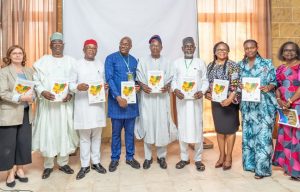The Federal Government of Nigeria has released a report as part of its efforts to identify the specific support needs of the federation’s 36 states and the Federal Capital Territory (FCT) to combat climate change.

Titled “Mapping Climate Change Impact, Policy, and Action in Nigeria’s 36 States and Federal Capital Territory (FCT),” the report is aimed at how to effectively domesticate policies concerning climate change to attract funds and investments to increase action at the subnational level and ease climate-related transitions for sustainable development.
Nigeria has a tropical climate, with heavy precipitation in the southwest and southeast and low precipitation in the north. According to Dr. Ishaq Salako, state minister of environment, this type of weather pattern can induce erosion and flooding in the south and aridity, drought, and desertification in the north.
The minister, who made the comment on Friday, November 17, 2023, in Abuja, during the official launch of the report, went on to clarify that these differences in weather conditions expose northern states to greater climatic vulnerability than those in the country’s southern region. Additionally, the prevalence of climate-sensitive agricultural practices also aligns with this pattern of vulnerability to climate change.
Thus, he explained, this study would help in assessing the awareness of climate change in every state in the nation, including the Federal Capital Territory, and explore the willingness of states to participate and improve their understanding and response to prevent climate catastrophe. It would also help the government develop particular policies and action plans to protect each state based on its climate risk.
“With this, funding support and resources can be effectively allocated and directed to areas that are most vulnerable and require urgent action,” Dr. Salako said.
Professor Chukwumerije Okereke, the convener and President of the Society for Planet and Prosperity (SPP), described climate change as one of the most significant development concerns confronting Nigeria today.
According to him, climatic impacts, such as flooding, desertification, drought, erosion, and sea level rise, are destroying ecosystems and livelihoods, thereby pushing many into poverty.
The Nigerian government signed the National Climate Change Law, which creates the National Council on Climate Change (NCCC), and pledged to achieve net zero emissions by 2060. In addition, to address the effects of climate change, it has a National Climate Change Policy, a Nationally Determined Contribution (NDC), and a few flagship projects like the Nigeria Erosion and Watershed Management Project (NEWMAP), the Agro-Climatic Resilience in Semi-Arid Landscape (ACReSAL), and the Great Green Wall (GGW).
Prof. Okereke did, however, point out that the majority of federal climate change activities and actions have paid little to no attention to state-level climate change policies, action plans, and investment. This, he says, is a considerable imbalance, given that the states that host the local populations face the majority of the burden of climate change impacts.
“Therefore, the implementation of policies and actions at the subnational level is crucial to addressing climate change and meeting Nigeria’s net-zero target and other national climate commitments,” he said.
The present circumstances, the convener argued, necessitate a better understanding of the subnational climate change governance environment, including the degree of climate change awareness, the scope and diversity of policies, and their degree of implementation.
In a similar spirit, Sam Onuigbo, Member of the Governing Board and Chairman of the North-East Development Commission’s (NEDC) Committee on Security, Climate Change, and Special Interventions, decried the nation’s vulnerability to the disastrous impacts of climate change.
As a result, he advised governors and local council chairmen to make adequate climate change budget provisions based on the new assessment.
“With the responsibilities assigned to the representatives of the subnational, governors, and local government chairmen by the Act, they should begin to make adequate budgetary provisions for improved climate change action and resilience,” he stated.
This is the first and most comprehensive mapping of Nigeria’s subnational climate action. It will increase public awareness of climate action, provide information on the state of climate change policies, draw attention to the shortcomings and efforts in subnational programmes and actions related to climate change, and promote better action from the public sector, private industry, civil society, or foreign donor organisations.
By Nsikak Emmanuel Ekere, Abuja
